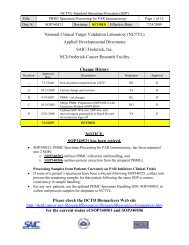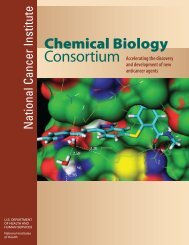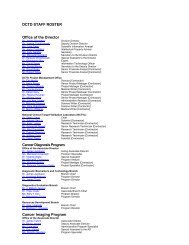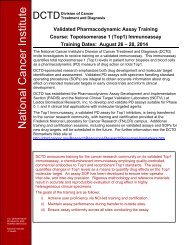National Cancer Institute - NCI Division of Cancer Treatment and ...
National Cancer Institute - NCI Division of Cancer Treatment and ...
National Cancer Institute - NCI Division of Cancer Treatment and ...
Create successful ePaper yourself
Turn your PDF publications into a flip-book with our unique Google optimized e-Paper software.
C A N C E R D I A G N O S I S P R O G R A M<br />
The <strong>Cancer</strong> Diagnosis Program strives to improve the<br />
diagnosis <strong>and</strong> assessment <strong>of</strong> cancer by effectively moving<br />
new scientific advances into clinical practice.<br />
The <strong>Cancer</strong> Diagnosis Program (CDP)<br />
strives to improve the diagnosis <strong>and</strong><br />
assessment <strong>of</strong> cancer by effectively<br />
moving new scientific advances into<br />
clinical practice. The program stimulates,<br />
coordinates, <strong>and</strong> funds resources <strong>and</strong><br />
research on diagnostics <strong>and</strong> improved<br />
technologies to better characterize cancers<br />
in order to develop information that can<br />
aid cancer patients <strong>and</strong> their physicians in<br />
clinical decision-making.<br />
CDP supports research at medical centers,<br />
hospitals, businesses, <strong>and</strong> universities<br />
throughout the United States, Canada,<br />
<strong>and</strong> other countries.<br />
CDP is divided into three branches:<br />
■ Diagnostic Biomarkers <strong>and</strong> Technology<br />
Branch<br />
■ Resources Development Branch<br />
■ Diagnostics Evaluation Branch<br />
CDP, <strong>of</strong>ten in cooperation with other programs<br />
<strong>of</strong> the <strong>National</strong> <strong>Cancer</strong> <strong>Institute</strong><br />
(<strong>NCI</strong>), <strong>of</strong>fers a range <strong>of</strong> initiatives that<br />
encourage <strong>and</strong> support research in cancer<br />
diagnostics <strong>and</strong> related development<br />
<strong>of</strong> technology <strong>and</strong> specimen resources.<br />
CDP administered approximately 400<br />
funded grants in 2005.<br />
O V E R V I E W<br />
Dr. Sheila Taube, Associate Director<br />
Sheila Taube, Ph.D., has served as Associate Director <strong>of</strong> the<br />
DCTD <strong>Cancer</strong> Diagnosis Program (CDP) since 1997. Under<br />
Dr. Taube’s leadership, CDP has launched the Program for<br />
the Assessment <strong>of</strong> Clinical <strong>Cancer</strong> Tests (PACCT), which is<br />
designed to ensure efficient <strong>and</strong> effective translation <strong>of</strong><br />
new knowledge <strong>and</strong> technology related to cancer diagnosis<br />
into clinical practice. The first prospective trial <strong>of</strong> a molecular<br />
signature for risk <strong>of</strong> recurrence in early stage breast cancer,<br />
the TAILORx trial, was developed as part <strong>of</strong> PACCT <strong>and</strong><br />
opened in 2006.<br />
Prior to serving as Associate Director <strong>of</strong> CDP, Dr. Taube was program director for<br />
biochemistry <strong>and</strong> then Chief <strong>of</strong> the <strong>NCI</strong> <strong>Cancer</strong> Diagnosis Branch, the predecessor <strong>of</strong><br />
the <strong>Cancer</strong> Diagnosis Program. In the <strong>Cancer</strong> Diagnosis Branch, Dr. Taube was instrumental<br />
in developing programs to use molecular technologies for cancer diagnosis.<br />
Dr. Taube serves on the American Society <strong>of</strong> Clinical Oncology’s Expert Panel to<br />
develop practice guidelines for the use <strong>of</strong> tumor markers for breast <strong>and</strong> colorectal<br />
cancer. She also contributed to a seminal paper in the Journal <strong>of</strong> the <strong>National</strong> <strong>Cancer</strong><br />
<strong>Institute</strong> on the methodology <strong>of</strong> evaluating prognostic markers <strong>and</strong> co-edited a<br />
special issue <strong>of</strong> Seminars in Oncology devoted to tumor marker development.<br />
Dr. Taube collaborated with the Receptor <strong>and</strong> Biomarkers Group <strong>of</strong> the European<br />
Organisation for Research <strong>and</strong> <strong>Treatment</strong> <strong>of</strong> <strong>Cancer</strong> (EORTC) to launch the biannual<br />
series <strong>of</strong> international meetings called “Molecular Markers for <strong>Cancer</strong>: From Discovery<br />
to Clinical Practice.” In 2004, Dr. Taube <strong>and</strong> colleagues developed the syllabus for a<br />
short course for industry, “From Hypothesis to Product: An EORTC-<strong>NCI</strong> Diagnostics<br />
Development Tutorial.” In 2005, Dr. Taube <strong>and</strong> colleagues published three separate<br />
articles about PACCT <strong>and</strong> personalized medicine.<br />
Dr. Taube received her bachelor’s degree in biology from Br<strong>and</strong>eis University <strong>and</strong><br />
her doctorate in microbiology from the University <strong>of</strong> Pittsburgh School <strong>of</strong> Medicine.<br />
Following postdoctoral work at Yale University, she joined the faculty <strong>of</strong> the University<br />
<strong>of</strong> Connecticut Medical School, where she used a viral system to investigate cell<br />
membrane protein processing.<br />
C A N C E R D I A G N O S I S P R O G R A M ■ 29










